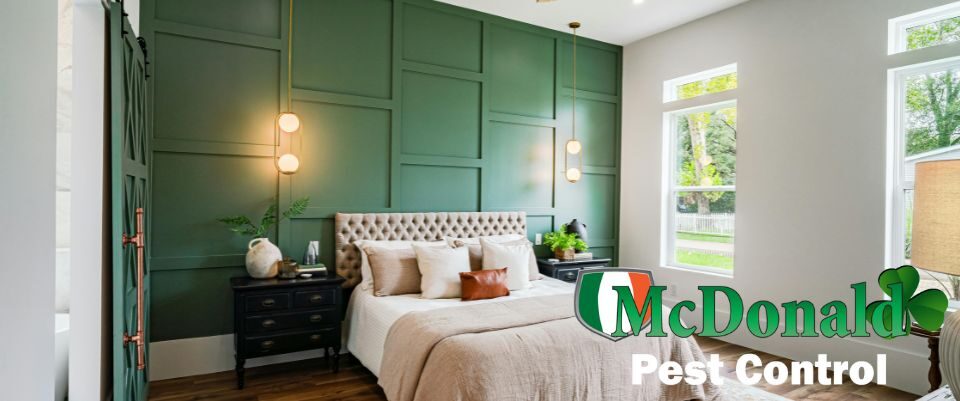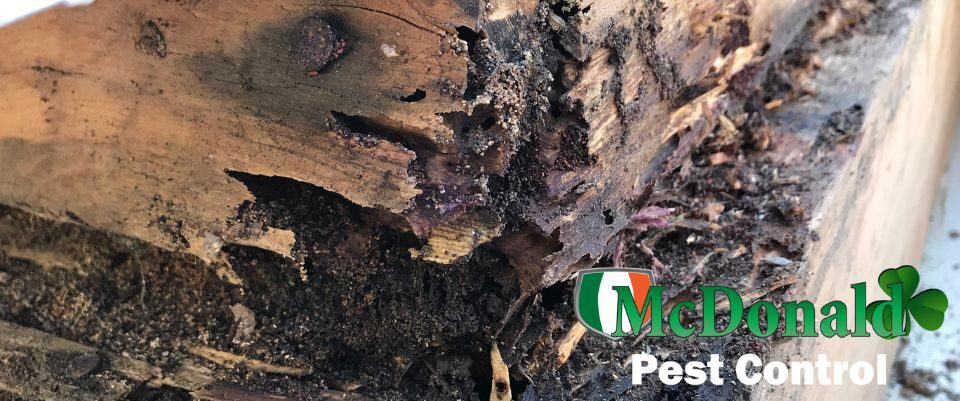
Squirrel Pest Control – Everything You Need to Know
May 7, 2025
Why Mosquitoes Love Your Yard & How to Evict Them
June 15, 2025Prevent Bed Bugs from Entering Your Mattress After Traveling This Summer
Bed bugs are persistent, unwelcome pests that can infest even the cleanest of homes, especially in warm, active areas like Tampa Bay. If you want to know how to prevent bed bugs, especially from getting into your mattress, the good news is there are several proactive steps you can take to keep these insects away and sleep soundly. Quick, practical habits, such as using protective covers, being vigilant for signs of bed bugs, regularly cleaning your bedding, and sealing cracks in your bed frame, play a major role in bed bug control.
Whether you’re a homeowner, a renter, or you travel frequently around Florida, knowing how to prevent bed bugs in your mattress helps you avoid a costly, stressful infestation. Below, we break down expert-backed strategies and common FAQs to help you keep bed bugs out of your bed for good.
- Use bed bug-proof protective covers on your mattress and box spring
- Inspect for signs of bed bugs regularly, especially after travel
- Keep clutter to a minimum and vacuum frequently
- Launder bedding in high heat and use sealed plastic bags for laundry transport
- Seal cracks in bed frames, walls, and flooring
- If you notice an infestation, consult a professional for bed bug heat treatment
Table of Contents
- Why Mattress Protection Is Essential for Preventing Bed Bugs
- Where Do Bed Bugs Hide in a Bedroom?
- How to Prevent Bed Bugs in Your Mattress: Step-by-Step
- Recognizing the Early Signs of Bed Bugs
- What to Do If You Suspect Bed Bugs
- Bed Bug Heat Treatment & Professional Options
- Quick Summary
- Frequently Asked Questions (FAQs)
Why Mattress Protection are Essential to Prevent Bed Bugs
Mattresses and box springs are some of the favorite hiding places for bed bugs. Bed bugs can squeeze into tiny crevices and folds of fabric, making it easy for them to access your mattress undetected. Once inside, they lay bed bug eggs and multiply quickly, making bed bug control difficult without professional intervention. Preventing bed bugs from entering your mattress is crucial to stop a bed bug infestation before it starts.
The Importance of Bed Bug Prevention:
- Bed bugs bite, causing itchy, uncomfortable welts.
- They can survive for months without feeding, making them hard to eradicate.
- Bed bug eggs are tiny and often hidden, prolonging infestations.
- Fast prevention is easier and less expensive than extermination.
Where Do Bed Bugs Hide in a Bedroom?
To prevent bed bugs, you first need to understand where bed bugs hide. In addition to your mattress and box spring, they seek out:
- Inside and under the bed frame
- In seams and crevices of mattresses and box springs
- Behind headboards
- In cracks and crevices of walls and floors
- Behind electrical outlet covers and picture frames
- Inside nightstands and nearby furniture
- In piles of laundry or clothes left near the bed
Regularly inspecting these areas can help you spot early signs of bed bugs.
How to Prevent Bed Bugs in Your Mattress: Step-by-Step
Following simple, effective strategies is the key to bed bug control in Tampa Bay, Clearwater, and throughout Florida. Here’s how to prevent bed bugs from getting into your mattress:
1. Install a High-Quality Protective Cover
Use a zippered, bed bug-proof encasement for both your mattress and box spring. These covers are designed to trap any existing bugs inside and block new bed bugs from entering or escaping. Choose encasements that are specifically labeled for bed bug protection and free of tears or gaps.
2. Regularly Inspect for Signs of Bed Bugs
Look for these common signs of bed bug presence:
- Tiny, rust-colored spots on sheets and mattresses (bed bug feces)
- Small, white bed bug eggs or shed skins
- Live bugs or crawling insects, usually visible at night
- Red, itchy bites in a zigzag or linear pattern on your skin
Early detection is key for effective bed bug control.
3. Reduce Clutter Around the Bed
Clutter provides more hiding places for bed bugs. Keep the area around your bed clear by:
- Storing items off the floor
- Using sealed plastic storage bins
- Vacuuming the room thoroughly, especially under and around the bed
4. Be Cautious When Traveling or Laundering
Bed bugs often hitchhike home via suitcases, clothing, or second-hand furniture. To prevent bed bugs after travel:
- Inspect hotel beds and headboards before putting down luggage
- Keep your suitcase elevated or stored in the bathtub during hotel stays
- Wash and dry clothes on high heat after returning home, especially if you used shared laundry facilities
- Transport clothing in sealed plastic bags when using public laundry facilities
5. Seal Cracks and Crevices
Inspect and seal any cracks or crevices in the walls, baseboards, bed frame, or nearby furniture where bed bugs hide. Use caulk to fill gaps and repair torn wallpaper.
6. Vacuum Regularly and Dispose of Bags Properly
Vacuum your mattress, box spring, bed frame, and surrounding areas at least weekly. Immediately place vacuum bags or canister contents in sealed plastic bags and discard outside.
7. Avoid Bringing Home Used Furniture
Second-hand mattresses and furniture can introduce bed bugs. Thoroughly inspect, preferably avoid, bringing used textiles into your home unless you’re certain they’ve been professionally cleaned and are pest-free.
8. Use Interceptors on Bed Legs
Install bed bug interceptor cups under each leg of your bed frame. These traps help catch bugs climbing up from the floor and make early detection easier.
Recognizing the Early Signs of Bed Bugs
Spotting the early signs of bed bug infestation is crucial for quick bed bug control. Pay attention to:
- Blood stains or dark spots on bedding
- Shed skins or eggs along mattress seams
- Unexplained itchy bites, especially upon waking
- Musty odor in the bedroom
If you notice any of these, it’s time to take immediate action.
What to Do If You Suspect Bed Bugs
If you observe signs of bed bugs, do not move bedding or furniture to other rooms, as this can spread the infestation. Instead:
- Contain infested linens in plastic bags before washing
- Launder on the highest heat setting and dry thoroughly (high heat kills all stages of bed bugs, including bed bug eggs)
- Avoid using insecticides or “bug bombs” on your own, as improper use can worsen the problem
- Contact a trusted local pest control provider for an inspection and customized treatment plan
Bed Bug Heat Treatment & Professional Options
For established infestations, DIY methods are rarely effective. Professional bed bug heat treatments, especially in warm, humid areas like Tampa Bay, are proven to kill bed bugs at all stages, including eggs, in mattresses and box springs. Bed bug control specialists will:
- Inspect your home thoroughly, including mattresses, furniture, and hidden crevices
- Use safe, high heat equipment to eliminate the entire infestation in one visit
- Provide guidance on how to prevent bed bugs from returning, including ongoing monitoring options
If you live in Tampa Bay or Clearwater and are struggling with bed bugs, professional heat treatment is often the safest, most reliable solution.
Frequently Asked Questions (FAQs)
How often should I check my mattress for bed bugs?
Every two to four weeks is ideal, and always after returning from trips or bringing home used furniture. Use a flashlight to inspect seams, tufts, and under your mattress.
Can bed bugs live in beds with metal frames?
Yes, bed bugs hide in any cracks—metal, wood, or fabric. Inspect all frame joints, screws, and attachments, not just the mattress itself.
Does washing sheets in hot water kill bed bugs?
Yes, laundering bedding and clothing with hot water and high heat drying cycles effectively kills bed bugs, nymphs, and bed bug eggs.
Are mattress protectors worth it for bed bug prevention?
Absolutely. Certified bed bug encasements offer a strong defense by preventing bugs from entering or escaping the mattress and box spring.
What should I do if my neighbor has bed bugs?
Alert your property manager if you share a building, and take immediate steps to seal cracks, use mattress covers, and reduce clutter. Monitor closely for signs of bed bug infestation.
Contact McDonald Pest Control for Bed Bug Prevention and Control in Tampa Bay
Don’t let your summer travels turn into a bed bug nightmare at home. With a few simple precautions, you can protect your mattress, and your peace of mind, all season long. If you suspect bed bugs or want expert help in keeping them out for good, contact McDonald Pest Control today. We specialize in bed bug prevention and treatment, offering fast, discreet, and effective solutions tailored for Florida homes.
Call now to schedule an inspection and sleep soundly again, bed bug bite-free.




